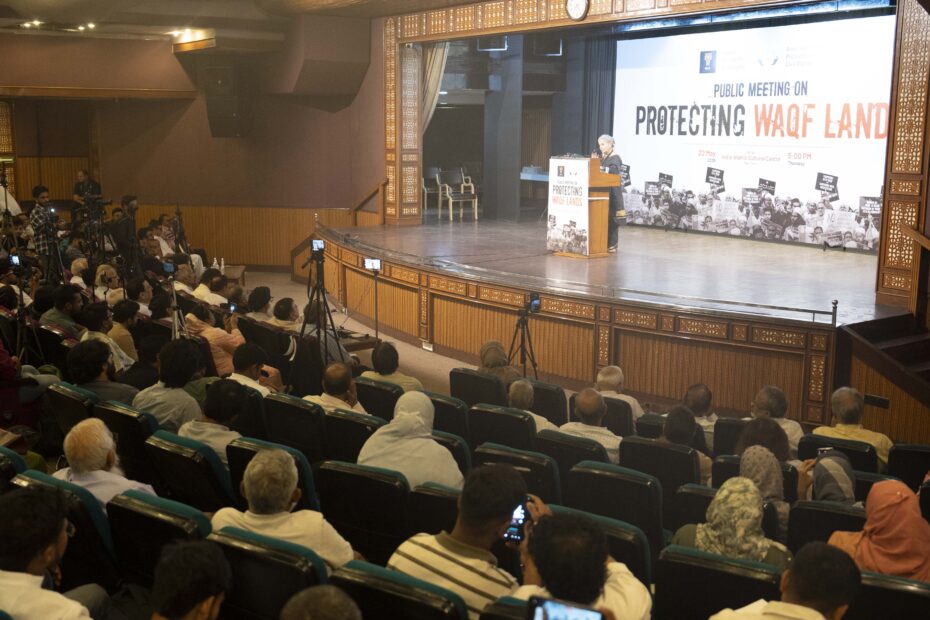22 May, 2025 | New Delhi: A public meeting on “Protecting Waqf Lands” was held at the India Islamic Cultural Centre, organized by the Indian Muslim for Civil Rights (IMCR) and Association for Protection of Civil Rights (APCR). The gathering brought together a wide array of political leaders, civil rights activists, legal experts, academics, and concerned citizens to collectively address the escalating threats to Waqf properties across India.
The meeting was addressed by an impressive panel including political leaders such as Agha Ruhullah Mehdi, Ashutosh, Awadhesh Prasad Singh, Ch. Iqra Hasan, Dr. Mohammed Javed,. Danish Ali, Mohammed Ali Shabbir, Maj. Javed Iqbal, Ruchi Veera, Mohammed Adeeb, Nasiruddin Siddiqui, Salman Khursheed, Sanjay Singh, Tariq Anwar and Ziaur Rahman Barq. Academic insights were provided by Prof. Ratan Lal, Prof. Manoj Kumar, Prof. VK Tripathi, and Ravi Rai. The meeting also featured prominent students leaders and activists including, Syed Nasir Hussain, Syeda Hameed, John Dayal, K Malik Mohtasim Khan, Nitish Jha, and Talha Mannan. The session was moderated by Nadeem Khan.
The event commenced at 5:00 PM and witnessed an impressive turnout of around 600 attendees. Speakers expressed deep concern over the increasing encroachments, unlawful acquisitions, and administrative neglect that have left thousands of Waqf lands vulnerable. The discussions centered on the urgent need for legal safeguards, and community mobilization to protect these lands that hold immense religious, educational, and charitable significance for the Muslim community.
The law was framed as a matter of land and administration, but speakers called it what it is: an attack on identity, faith, and rights. “This is a question of identity and existence. We are targeted because we are politically sidelined and considered irrelevant,” said Major General (Retd.) Javed Iqbal.
Highlighting the pattern of state overreach, Nitish Kumar, President of JNU Students’ Union, said, “This government is trying to control everything, from who we marry to what we eat, and this law is yet another tool to push the country’s largest minority further into marginalization. We nullified CAA-NRC, and we will nullify this too.”
Many speakers dismantled the state and media narrative justifying the law under the pretext of reform or regulation. Malik Mohtasem Khan, vice-president of Jamaat-e-Islami Hind, said, “In Islam, one can only Waqf what they truly own, and once they do, that land is no longer theirs but for the community’s benefit. It’s not royal gifts that built Waqf, it’s the generosity of traders, workers, and ordinary Muslims.” Supporting this, Prof. V.K. Tripathi stated, “The government says Waqf isn’t intrinsic to Islam. I say religion is not only scripture, it is lived experience. Waqf has been practiced since the 1700s, without occupying government land.”
Others emphasized how this law plays into a deeper political strategy. “We oppose this bill not because it’s from the BJP, but because it lacks sincerity. This land was not given by the government, it is donated by the Muslims. When they say Masjids and Madrasas are untouched, ask them why our mosques in Sambhal are facing action. Their words betray their intent,” said Ziaur Rahman Barq, MP from Sambhal.
Talha Mannan, National Secretary of the Students Islamic Organisation (SIO), warned of the dehumanization at play, “Muslims have become the new untouchables. To say this bill is for our benefit is an insult when institutions like AMU and JMI stand as living examples of the blessings of Waqf.”
Speakers emphasised that this law isn’t solely about religion, it simply does not align with the tenets of the Indian constitution.“Waqf land belongs to Allah, he will protect it. But the Indian constitution is ours. We must protect it and safeguard it first and foremost. This law is against the basic tenets of our constitution,” said Aga Ruhullah Mehdi, MP from Srinagar.
MP Iqra Hasan called attention to the grassroots impact of the bill, “This law will hit villages and districts first, where people are most unaware. We must educate, mobilize legal aid, and break the politics of isolation.”
From a broader civil rights perspective, John Dayal, civil society activist, said, “Laws targeting one community are often recycled with minimal changes to target others. The scale of Waqf in India, touching over four lakh villages, is not even fully understood by the Muslim community itself.”
The event was a reminder that resistance to the law is not exclusive to Muslims. “This fight isn’t just about Waqf, it’s about protecting every community’s right to donate, express, and practice freely. The 232 votes against this bill, mostly non-Muslims, prove secularism still breathes in this country. The Sachar Committee found over 300 cases of the government itself grabbing Waqf land,” said MP Sanjay Singh.
Former MP Mohammed Adeeb closed the gathering with a call for both legal resistance and electoral accountability, “We must ask ourselves, are we truly a secular country in our actions? If there’s no legal stay, our reply will be at the ballot box. Bihar will hear us.”
The meeting concluded with a collective resolution to continue the struggle for justice, accountability, and preservation of Waqf lands through legal, political, and social avenues. APCR, IMCR and the attendees pledged to follow up with actionable steps and further community engagement in the coming months.
